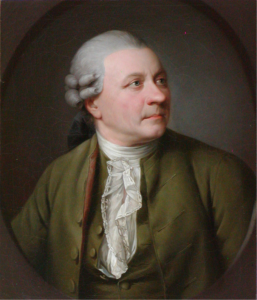The great Halleluja
(Poet's title: Das große Halleluja)
Set by Schubert:
D 442
for single voice or chorus and piano
Schubert did not set the stanza in italics[June 1816]
Ehre sei dem Hocherhabnen, dem Ersten, dem Vater der Schöpfung,
Dem unsre Psalmen stammeln,
Obgleich der wunderbare Er
Unaussprechlich, und undenkbar ist.
Eine Flamme von dem Altar an dem Thron
Ist in unsre Seele geströmt!
Wir freun uns Himmelsfreuden,
Dass wir sind, und über ihn erstaunen können.
Ehre sei ihm auch von uns an den Gräbern hier,
Obwohl an seines Thrones lezten Stufen
Des Erzengels niedergeworfene Krone
Und seines Preisgesangs Wonne tönt.
Ehre sei und Dank und Preis dem Hocherhabnen, dem Ersten,
Der nicht begann und nicht aufhören wird,
Der sogar des Staubs Bewohnern gab,
Nicht aufzuhören.
Ehre dem Wunderbaren,
Der unzählbare Welten in den Ozean der Unendlichkeit aussäte!
Und sie mit Heerschaaren Unsterblicher füllte,
Dass ihn sie liebten, und selig wären durch ihn!
Ehre dir, Ehre, Ehre dir,
Hocherhabner, Erster,
Vater der Schöpfung,
Unaussprechlicher, o Undenkbarer!
Glory to the highly exalted one, the first, the father of creation,
For whom we stammer our Psalms,
Even though the amazing ‘He’
Is himself inexpressible and inconceivable.
A flame from the altar by the throne
Has flowed into our soul!
We enjoy heavenly joys at the thought
That we exist and that we can be astonished by Him!
Glory to him even from us here by our graves,
Even here at the most distant steps up to his throne
Where the Archangel has thrown down his crown
And the bliss of his song of praise can still be heard.
Honour and thanks and praise to the most highly exalted, the first,
Who had no beginning and will have no end!
He who even gave to those of us who live in dust
The gift of immortality.
Glory to the Amazing one,
He who scattered countless worlds across the ocean of infinity!
And who filled them with hosts of immortals,
So that they could love Him and be made blessed through Him!
Glory to you! Glory to you! Glory to you!
Most exalted! First!
Father of creation!
Inexpressible! Inconceivable!
All translations into English that appear on this website, unless otherwise stated, are by Malcolm Wren. You are free to use them on condition that you acknowledge Malcolm Wren as the translator and schubertsong.uk as the source. Unless otherwise stated, the comments and essays that appear after the texts and translations are by Malcolm Wren and are © Copyright.
☙
The Scholastic theologians of the 13th and 14th centuries called this the via negativa: the negative way of knowing about God. We are so limited that we cannot know infinity, only limitations. We cannot recognise perfection, only faults. It therefore follows that, outside of explicit revelation, our knowledge of the divine is based on extrapolating from what God is not. In this text he is ‘unausprechlich’ (literally, not pronounceable), ‘undenkbar’ (literally, unthinkable), He is ‘der nicht begann und nicht aufhören wird’ (the one who did not begin and will not come to an end).
☙
Original Spelling Das grosse Halleluja Ehre sey dem Hocherhabnen, dem Ersten, dem Vater der Schöpfung, Dem unsre Psalmen stammeln, Obgleich der wunderbare Er Unaussprechlich, und undenkbar ist. Eine Flamme von dem Altar an dem Thron Ist in unsre Seele geströmt! Wir freun uns Himmelsfreuden, Daß wir sind, und über Ihn erstaunen können! Ehre sey ihm auch von uns an den Gräbern hier, Obwohl an seines Thrones lezten Stufen Des Erzengels niedergeworfene Krone Und seines Preisgesangs Wonne tönt. Ehre sey und Dank und Preis dem Hocherhabnen, dem Ersten, Der nicht begann, und nicht aufhören wird! Der sogar des Staubes Bewohnern gab, Nicht aufzuhören. Ehre dem Wunderbaren, Der unzählbare Welten in den Ocean der Unendlichkeit aussäte! Und sie mit Heerschaaren Unsterblicher füllte, Daß Ihn sie liebten, und selig wären durch Ihn! Ehre dir! Ehre dir! Ehre dir! Hocherhabner! Erster! Vater der Schöpfung! Unaussprechlicher! Undenkbarer!
Confirmed by Peter Rastl with Schubert’s source, Oden von Klopstock. WIEN, gedruckt bey Joh. Thomas Edlen von Trattnern, k.k. Hofdruckern und Buchhändlern. 1784, pages 66-67; and with Klopstocks Oden. Erster Band. Leipzig bey Georg Joachim Göschen. 1798, pages 227-228.
To see an early edition of the text, go to page 66 [100 von 322] here: http://digital.onb.ac.at/OnbViewer/viewer.faces?doc=ABO_%2BZ160267609


